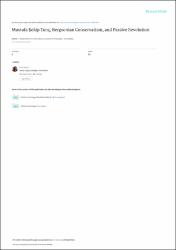| dc.contributor.author | Subaşı, Erol | |
| dc.date.accessioned | 2022-09-15T10:53:43Z | |
| dc.date.available | 2022-09-15T10:53:43Z | |
| dc.date.issued | 2021 | en_US |
| dc.identifier.citation | Subasi, E. (2021). Mustafa Sekip Tunc, Bergsonian Conservatism, and Passive Revolution. Beytulhikme- International Journal of Philosophy, 11(1), 139-154. http://doi.org/10.18491/beytulhikme.1590 | en_US |
| dc.identifier.issn | 1303-8303 | |
| dc.identifier.uri | http://doi.org/10.18491/beytulhikme.1590 | |
| dc.identifier.uri | https://hdl.handle.net/11436/6465 | |
| dc.description.abstract | The 1930s in Turkey is a highly controversial socio-political topic with two main competing interpretations: the liberal-positivists consider the 1930's transformation as a progressive move whereas conservative-idealists regard it as a top-down break from tradition and history. However, there are other readings that bridge these two positions. To analyze one of these, this study establishes links between Mustafa Sekib Tunc (1886-1958), a Turkish psychologist and philosopher, the French philosopher Henri Bergson (1859-1941), the French sociologist Emile Durkheim (1858-1917), and the Italian philosopher Antonio Gramsci (1891-1937). It does this through the latter's concept of "passive revolution" to contribute to the understanding of Turkey's socio-political transformation during the 1930s. The main argument is that Tunc's anti-empiricist and anti-positivist philosophy, based on Bergson's spiritualist and biologist-holisticism, meets with Durkheim's positivist collectivism. This enables Tunc to interpret the 1930s' passive revolution as a "conservative revolution" that found its expression in the formulation of the "unprivileged-classlessfused-mass" and an "organic society". Tunc, following Bergson, conceives history and society biologically, as a socio-functional whole that helps mask sociopolitical divisions and struggles within the society. | en_US |
| dc.language.iso | eng | en_US |
| dc.publisher | Beytulhikme Felsefe Çevirisi | en_US |
| dc.rights | info:eu-repo/semantics/openAccess | en_US |
| dc.subject | Mustafa Sekip Tunc | en_US |
| dc.subject | Conservatism | en_US |
| dc.subject | Henri Bergson | en_US |
| dc.subject | Passive revolution | en_US |
| dc.subject | Turkish political life | en_US |
| dc.title | Mustafa Sekip Tunc, Bergsonian conservatism, and passive revolution | en_US |
| dc.type | article | en_US |
| dc.contributor.department | RTEÜ, İktisadi ve İdari Bilimler Fakültesi, Siyaset Bilimi ve Kamu Yönetimi Bölümü | en_US |
| dc.contributor.institutionauthor | Subaşı, Erol | |
| dc.identifier.doi | 10.18491/beytulhikme.1590 | en_US |
| dc.identifier.volume | 11 | en_US |
| dc.identifier.issue | 1 | en_US |
| dc.identifier.startpage | 139 | en_US |
| dc.identifier.endpage | 154 | en_US |
| dc.relation.journal | Beytulhikme- International Journal of Philosophy | en_US |
| dc.relation.publicationcategory | Makale - Uluslararası Hakemli Dergi - Kurum Öğretim Elemanı | en_US |


















